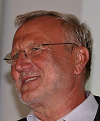22nd Karlsruhe Dialogues - Speakers
Morning Panel Discussion: (Artificial) Intelligent Cities of Tomorrow
Wolfgang Mayer
Speaker
Wolfgang Mayer studied Architecture in Innsbruck and Stuttgart. After graduating, he frequently travelled to Cairo where he worked for many years at the German Archaeological Institute (DAI) as an excavation architect, responsible among other things for the reconstruction of the Satet Temple in Aswan, Egypt. Besides the restoration of archaeological sites, as a member of the UNESCO team, he led a series of restoration projects on buildings in the old city of Cairo. From 1998 to 2005, he was also active at the Archaeological Faculty of Cairo University as a visiting professor and as a long-term lecturer for the German Academic Exchange Service (DAAD), and as a visiting lecturer in the Architecture Department at Ain Shams University in Cairo and at the Suez Canal University in Ismailia, Egypt. Furthermore, he worked as a consultant, project coordinator, and researcher at the DAI, the German Agency for International Cooperation (GIZ), and the Aga Khan Foundation. As director of the Cairo office of the Hanns Seidel Foundation, from 2005 to 2011 he was involved in numerous urban planning and development projects in Egypt, and in the framework of many projects he cooperated with organisations such as the Goethe Institute, the DAAD, and the GIZ. In 2007, in collaboration with Philipp Speiser, Mayer published the book Der Vergangenheit eine Zukunft. Denkmalpflege in der islamischen Altstadt von Kairo 1973-2004. In Germany he has also worked on the preservation of historical buildings and works of art: from 1981 to 1991, he was employed at the State Monument Conservation Agency of Baden-Württemberg and from 1991 until his retirement in 2011, he was the Head Conservator of the federal state capital Stuttgart. Mayer is a member of several international organisations, including UNESCO Germany.
Statements
1. What do you consider to be an ‘intelligent’ city?
Smart Cities should involve an interplay between, on the one hand, intelligent energy and communication technologies and, on the other hand, an evolved urbanity that also references historical guidelines. If urban processes are to be improved for the future, data already gathered must be applied efficiently.
2, In your opinion, what are the most urgent problems that have to be solved on the way to intelligent cities?
- Strengthening the formal and ongoing education of the city’s inhabitants/citizens
- Improvement of digitisation
- Energy efficiency
- Environmentally friendly mobility
3. What are, in your opinion, the most exceptional chances arising with the change towards smart cities?
- Managing growth in urban areas
- Improving citizens’ quality of life

